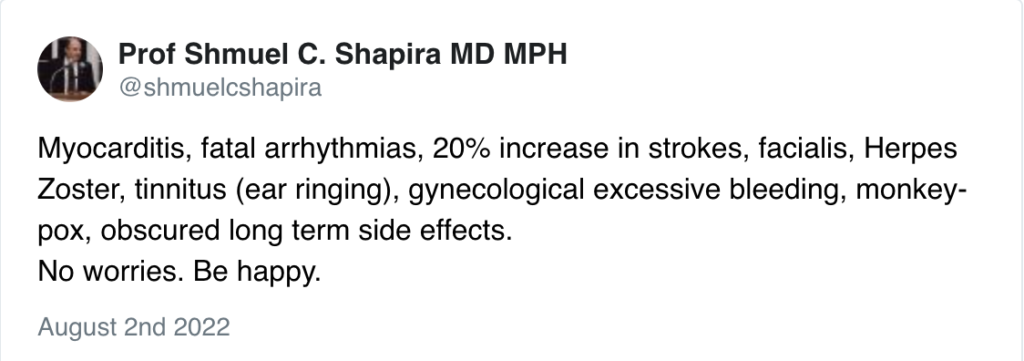Professor Shmuel C Shapira, MD MPH is a top-level Israeli professor who served as the Director of the Israel Institute for Biological Research from June 2013 until May 2021. Professor Shapira has an impressive resume which includes past jobs as Deputy Director-General of the Hadassah Medical Organization, Director of the Hebrew U Hadassah School of Public health, and the founder and head of the Dept of Military Medicine of the Hebrew University Faculty of Medicine and IDF Medical Corps.
Professor Shapira was intimately involved in the Israeli response to the outbreak of Covid-19 and was recruited by the Israeli government to lead his team of Israeli researchers in creating and manufacturing a vaccine for the public in Israel and in the Palestinian Authorities. In December of 2019, he and his team began to pick up on the rumblings of a crisis in China, as alerts started to emerge from the WHO. The mission of the IIBR is pandemic preparedness and the ability to create a vaccine for the population quickly and safely.
Behind the Scenes
On February 1, 2020, Professor Shapira was at the cinema watching a movie when he noticed 5 missed calls on his phone. He thought possibly a war had broken out, so he went to take the call and was informed that the Israeli government was requesting his presence at a meeting the following day regarding the capability of his Institute to produce a vaccine for the incoming virus. He quickly consulted with senior-level doctors and scientists, as well as his team at IIBR. As they saw it, the options that were available to them for vaccine production included an attenuated virus, a dead virus, a protein-based vaccine, or messenger RNA. Professor Shapira was against using mRNA because he felt it was too bold of a risk. He and his team chose a virus for animals and decided to engineer it with Covid spikes as the base for their vaccine. He chose this method based on an evaluation of a vaccine produced by Merck for Ebola. In the previous five years, they had vaccinated 300,000 people with this method and had seen safe and efficacious results.
Professor Shapira and his team prepared a presentation for the big meeting and presented it to the National Security Council. The NSC brought the plan to Bibi Netanyahu who was Prime Minister at the time, and he liked it. They held a broader meeting and finalized Shapira’s plan. His team immediately got down to business, and worked 24/7, even through Yom Kippur in two consecutive years – the holiest day on the Jewish calendar, and a day when all work around the entire country of Israel pauses for 25 hours of prayer and fasting.
The Plan
The plan was to produce 15 million units of the vaccine for the populations of Israel and the PA, and they had the capabilities to do so. After two weeks of work, the council revised its decision to produce homegrown vaccines and decided instead to collaborate with the big pharmaceutical companies, but shortly after that they reversed course and went back to the original plan. A few months into their work, there was a noticeable shift in the relationship between the IIBR and the government agencies. They started hitting regulatory obstacles that came from the Ministry of Health and the Ministry of Finance. The MOH put regulations in place for the creation of their vaccine that far exceeded standard regulatory procedures. Every step of the process was stalled and slow-walked by the agencies. The vaccine was ready by the end of July 2020 and had passed through animal trials. They started to prepare to hire an outside company to administratively run human clinical trials, to begin on Sep 1, 2020. After multiple delays from the Ministry of Health, they finally began their first human trials on Nov 1, 2020. Their Phase 1 proved safety. As they headed into Phase 2, they encountered their next obstacle. The Ministry of Health refused to give the clinical trial volunteers the Green Pass that allowed them to move about the country at the time because they didn’t take the Pfizer vaccine for weeks. Professor Shapira tried to get that decision reversed and ultimately succeeded, but meanwhile, the team ended up losing more than half of its volunteers. It became extremely difficult to find willing participants for a trial because the vast majority of the country was in the process of getting their Pfizer vaccine.
The purpose of Phase 2 is to continue to prove safety in a wider population, and to begin to gauge efficacy and dosing. Phase 2 proved the vaccine to be safe, although they raised the dose slightly. As they prepared for Phase 3, it became clear that trials would have to be abroad because the pool of unvaccinated Israelis became too small. Meanwhile, they continued with animal trials, and in the last year since Omicron began to circulate, their vaccine is proving to be up to 4x more effective than Pfizer and Moderna, although it’s still less effective than it was against the original Wuhan strain.
The obstacles continued throughout the turnover in government, and Phase 3 was never launched. The program ground to a halt. Professor Shapira and his team had been approached by multiple other countries who were interested in their research and offered to host Phase 3 trials, including the US, but that too never materialized. Eventually, IIBR pulled the project completely.
In Professor Shapira’s opinion, it’s a disgrace that the CEO of Pfizer, Albert Bourla, received the Israeli Genesis award while a homegrown solution created by Israel’s top scientists was effectively blocked by its own government.

Side Effects
Professor Shapira is optimistic that their significant research won’t go to waste, and will be used in future projects. Meanwhile, as someone with an inside view of this entire process, he publicly discusses the unprecedented and rising number of vaccine side effects that are presenting in populations all over the world, Israel included, as well as the failure of the mRNA vaccine to protect from infection. In his view, that’s not a vaccine at all, as a vaccine should provide almost complete protection for a significant amount of time.

The debate for or against socialized medicine is for another time, and as with everything there are pros and cons. The medical system in Israel has many amazing qualities and brilliant doctors, but the government-run nature of the system means that there’s near complete control from the top down. Israel vaccinated almost everyone with the Pfizer vaccine and has no comprehensive process for collecting adverse events reports. There are no widespread proactive queries about side effects and most doctors are employed by the government, which unfortunately is preventing them from both speaking out about the harms they’re seeing from the vaccine and from being able to treat them properly.
Vaccination for Babies- REJECTED
The Israeli public has decisively rejected the Covid vaccine for their babies. The government approved it for babies ages 6 months – 5 years following the FDA approval in the US, only the 2nd nation in the world to do so. Appointments opened up earlier this month, and a stunningly low .04% of eligible children have appointments set for the Covid vaccine.

Professor Shapira continues to bravely speak out about injuries caused by the vaccine as well as overall criticism for the way Israel responded to the pandemic, in a Hebrew book called “The Pandemic Circus”, on Twitter and in this video testimony, in Hebrew, for a government parliament committee.
KanekoatheGreat published a fantastic post about Professor Shapira, his recent suspension from Twitter, and the timeline of his public comments.
The injuries and sudden deaths seem to be accelerating. 7 young Canadian doctors have died in the past few weeks, adding to the previous 7 who died since Nov 2021. This is directly touching more and more people, even if a portion of those don’t see the connection at this point. As painful as it is, our job is to present reality in a way that the deniers will no longer be able to deny because the only way to solve a problem is by acknowledging it exists.



 Whatsapp
Whatsapp




